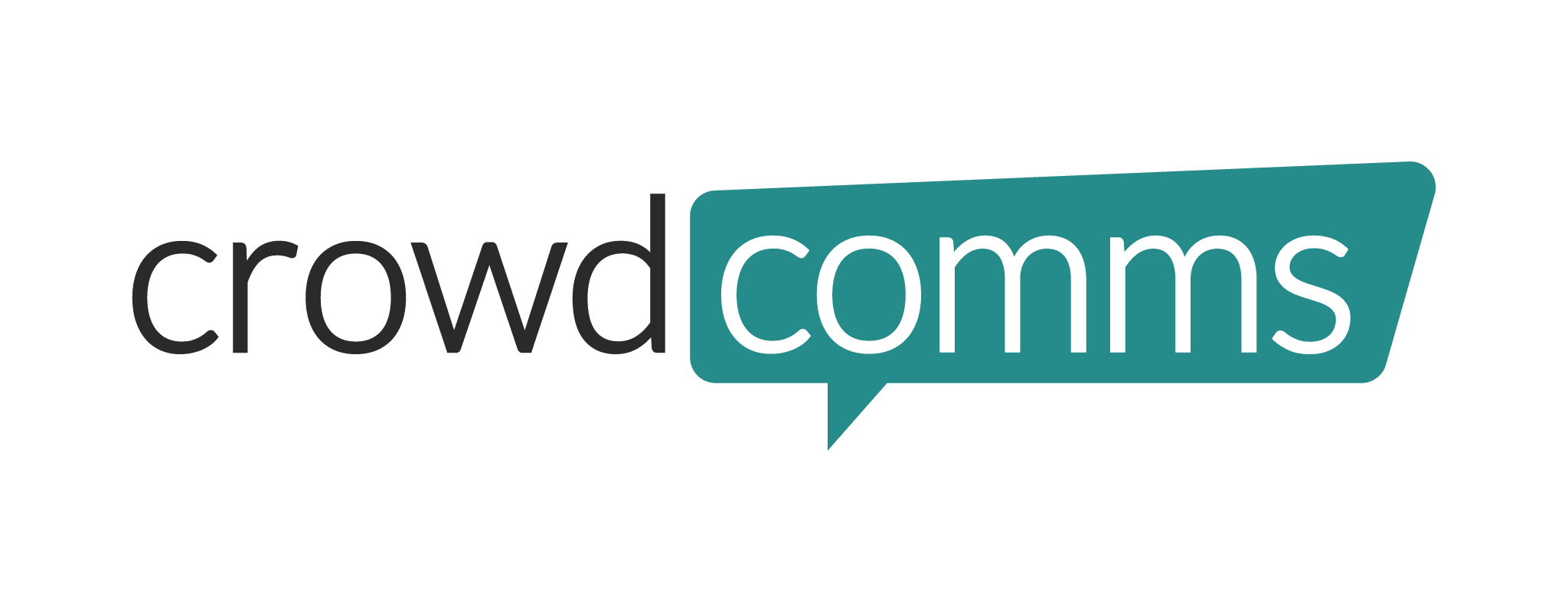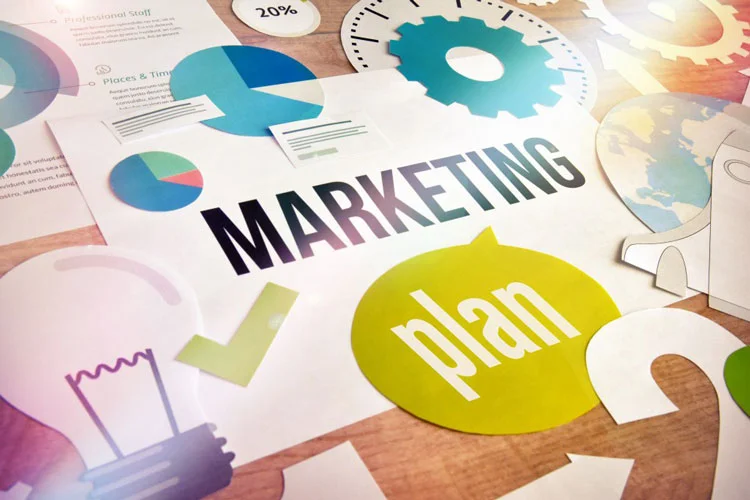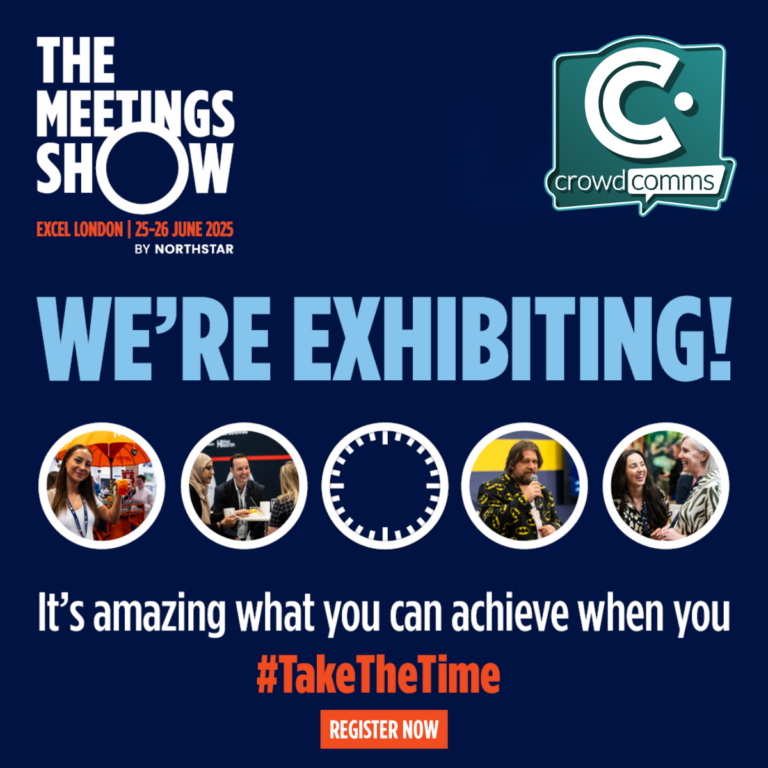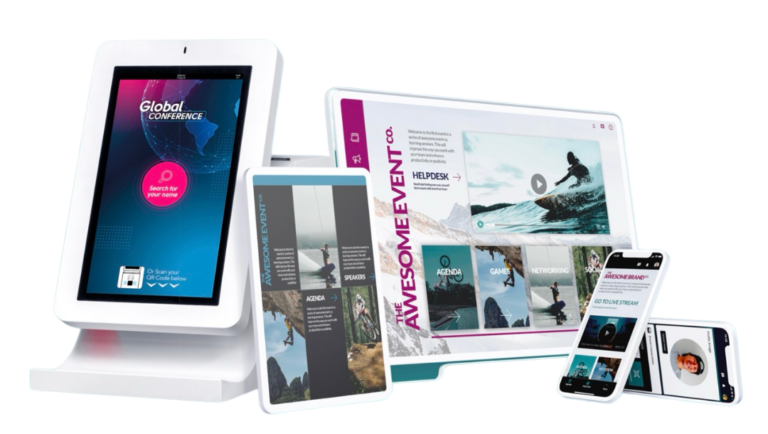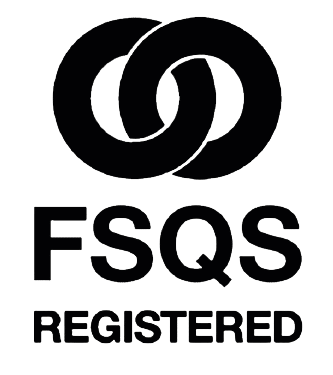
With the digital revolution, however, the fabric of event marketing is undergoing a significant transformation. This shift demands a strategy transcending traditional methods and adapting to a connected, digital-first era.
Through this Event Marketing 2024 article, we explore the tactics that will help you create an event marketing plan in 2024 that is unparalleled in its impact and success as well as look at how to prioritise events within your own corporate marketing strategy.
The Evolution of Event Landscapes
Event marketing has always been about the experience—the tactile handshake, the ambient hum of a trade hall, the direct eye contact during a pitch. Yet, as screens become the new handshakes and webinars the new conference halls, marketers are called upon to rethink their approach.
Events such as conferences, trade shows, and exhibitions now extend beyond their physical confines into digital spaces, becoming powerful community-building platforms. These aren’t mere channels for product promotion; they are ripe ecosystems thriving with customer engagement, brand storytelling, and lead cultivation. They are hybrid event communities.
Benefits of Event Marketing
Despite the proliferation of digital channels, event marketing’s crown shines undiminished.
Its unique proposition? The unparalleled engagement that comes with personal interaction—even if that interaction happens via a live stream or virtual booth. It’s live, it’s real, it’s human powered.
Highlighted benefits of event marketing include:
Generating business: Events serve as a launchpad for direct sales and closing deals within the warm atmosphere of personalised interaction.
One-on-One customer engagement: They furnish a stage for detailed product showcases and question-and-answer sessions that foster deep connections.
Brand awareness building: Businesses can shine in the industry spotlight, making memorable impressions that resonate with attendees.
Lead generation: Each registration, each handshake—virtual or otherwise—is a potential lead, a wellspring of opportunity.
Exposure and education: Events educate both the brand and the consumer, promoting thought leadership and keeping one’s finger on the industry’s pulse.
The benefits are clear: through captivating event marketing, you cloak your brand in a visible aura that attracts and educates, turning spectators into leads and leads into evangelists. But such alchemy doesn’t happen without strategic planning.
Integrating Event Marketing Strategies
It’s not enough to simply host or attend events.
A strategy that integrates event marketing with content creation, social media promotion, and digital relationship management invites a richer, more sustained engagement. This is particularly salient for brands keen on cultivating vibrant communities around their products and ethos.
To spearhead these efforts, leveraging word-of-mouth marketing platforms, event apps and digital platforms becomes critical—tools that facilitate not just event planning and operational delivery, but also data capture and attendee engagement.
How to Create an Event Marketing Plan
Creating an event marketing campaign enables targeted and systematic promotion, key ingredients for measuring success against SMART goals.
Here’s a blueprint to structure your next plan:
SMART event goals
First you need to understand what your SMART goals are. SMART stands for specific, measurable, attainable, relevant and timely. If you keep these printed out and next to your computer when you go into planning mode, it will help you to stay focused and streamline your planning process.
Specific: What is the purpose of your event? Who do you want to attend?
Measurable: How much revenue do you want to generate from ticket sales or sponsorships? How many leads should the event generate?
Achievable: Is your goal realistic with the resources available to you? Do you have enough time, budget and staff to achieve your goals?
Relevant: Does this goal align with your overall business objectives or marketing strategy?
Timely: When do you want to see results? Have a clear timeline in place for planning, promoting and executing the event.
How to create an event identity
Creating an event identity is crucial to standing out in a crowded market. It also helps attendees understand what to expect and builds excitement for your event from the moment they interact with your event brand.
Here are some elements that can help you create a strong event identity:
Event name: Choose a unique and memorable name that reflects the purpose and theme of your event.
Logo: Design a visually appealing logo that is consistent with your event’s branding and can be used on all promotional materials.
Brand colours: Select a colour palette that evokes the tone and feel of your event. Use these colours consistently across all marketing materials.
Event tagline: Create a catchy and concise tagline that captures the essence of your event and resonates with attendees.
Establish target event audience
To create an effective event marketing campaign, you need to understand who your target audience is and how best to reach them. You should build an ideal customer profile of each audience type you may have attend your event or conference.
For example, if you are planning a trade show for B2B professionals, your ideal customer profile may include:
Job title: C-level executives, managers or business owners.
Industry: Specific industries that align with your event focus.
Demographics: Age, gender and income range of potential attendees.
Pain points: Identify the problems and challenges your target audience faces in their industry. This is key – if you know what pains they have, you know what content or products to deliver to attract them to your event.
Interests: What topics and trends are your target audience interested in learning about at a trade show?
Once you have a clear understanding of your target audience, you can tailor your event marketing messaging and tactics to effectively reach and engage with them. This could include targeted email campaigns, social media advertising, or partnering with industry influencers to promote your event.

How to Market to your Event Audience
To successfully market to your event audience, you need to use a combination of targeted tactics that reach them across multiple channels. Here are some effective strategies for marketing to your event audience:
Content marketing: Create valuable and relevant content that speaks to the interests and pain points of your target audience. This can include blog posts, videos, or social media posts. Think about interviewing your speakers and reusing that content 20 times at least across all of your marketing channels.
Email marketing: Build an email list of interested attendees and send targeted messages that promote your event.
Social media marketing: Utilise various social media platforms to reach and engage with your target audience. This could include creating a hashtag for your event, partnering with influencers, or running paid ads.
Event partnerships: Collaborate with other businesses or organizations to cross-promote your event and expand your reach. This can include co-hosting events, guest blogging, or offering special discounts to each other’s audiences.
Attendee referrals: Encourage attendees to invite their colleagues and friends to the event by creating a referral program or offering incentives for bringing new attendees.
By using a combination of these tactics, you can effectively market your event to your target audience and increase attendance. It’s important to continuously track and measure your efforts to see what is working and make adjustments accordingly to your event marketing strategy.
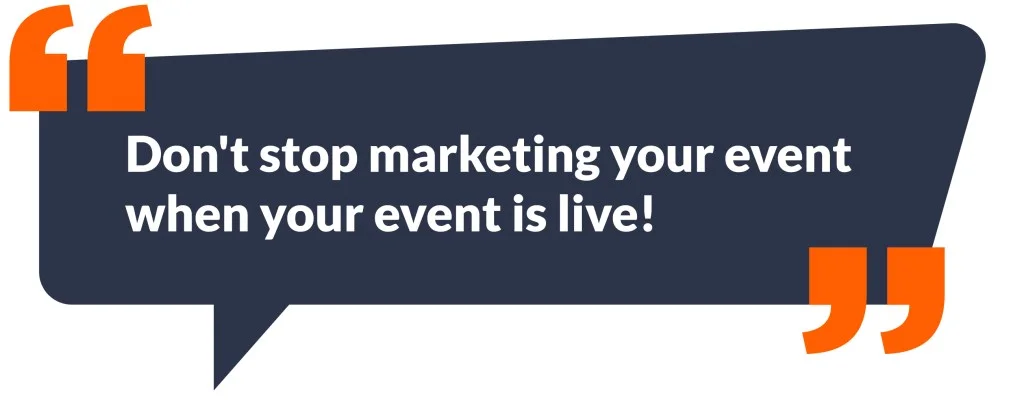
This is an essential part of your event marketing plan, as you want to ensure those who didn’t know about your event or couldn’t attend this year’s conference really want to register and attend the next one.
It’s also essential to engage with attendees during and after the event to keep them interested and coming back for future events.
Here are some ways you can continue marketing your event while it is live:
Live updates on social media: You’ll know where your audience plays, because you identified that in your Ideal Customer Profile. So, utilise those platforms, such as X/Twitter, LinkedIn, TikTok, or Instagram, to share real-time updates from the event. This not only keeps attendees engaged but also creates FOMO (fear of missing out) for those who may want to attend in the future.
Live streaming: Consider live streaming portions of your event, such as keynote speeches or panel discussions, for those who couldn’t attend in person. This allows them to still engage with your event and potentially attracts them to attend in the future.
Post-event content: After your event, create and share relevant content such as videos, photos, and blog posts highlighting key takeaways or memorable moments from your event. This not only keeps attendees engaged but also showcases the value of attending your event for those who may have missed it.
Discounts for future events: Offer discounted tickets or special promotions to attendees who sign up for your next event while still at the current one. This encourages repeat attendance and also helps build excitement for future events.
Offer free photo booths: Set up a photo booth with props or create something special with event engagement specialists Noonah offering your attendees something Noonah unique to take home – in the digital sphere – and create shareable moments from your event, promoting it to a wider audience.
Continuously promoting and engaging with your audience during and after the event is crucial for building brand awareness, increasing attendance, and retaining loyal attendees for future events. Don’t underestimate the power of ongoing event marketing and make sure to include it in your overall event planning strategy.
Real-time Event Analytics and Adaptive Planning
Another area where event marketing has seen significant advancement is in real-time analytics.
Today’s marketer must be nimble, using live data to adapt event strategies on-the-fly. From assessing attendee engagement to measuring lead conversion rates, a vigilant eye on key performance indicators (KPIs) ensures an agile response to the dynamic nature of event-based interactions.
Real-time analytics enable us to ask and answer questions instantaneously: Which speaker sessions drove the most social media buzz? What topics garnered high audience interaction rates? Which networking configurations led to meaningful business connections?
This knowledge helps fine-tune not only the current event but also future event strategies for maximised impact. Through understanding who met whom, who went wear, what was popular at your event, and who the key influencers were, you can make strategic adjustments in real-time to ensure your event is successful and engaging.
As technology continues to evolve, so does the ability to capture and analyse event data. This allows for a more efficient and effective approach to marketing events, leading to better attendee experiences and increased ROI – proof of return on investment for your exhibitors or sponsors.

How to Measure your Events Performance
As mentioned, tracking and measuring your event marketing efforts is vital to understanding what is working and what adjustments need to be made.
But how do you measure the success of your event? Here are some key metrics to consider:
Attendance: This is usually the most obvious metric for determining success, but it’s important to also look at the quality of attendees. Are they your target audience? Did they engage with your event?
Social media engagement: This can include metrics such as reach, impressions, likes, shares, and mentions using your event hashtag or social media handles.
Lead generation: Are you able to track leads generated from your event? This could be through email signups, business card exchanges, or contact form submissions or your exhibitors lead scanners / apps.
Meetings had: With the use of event apps and event platforms, you can monitor how many meetings occur at your event and also between whom.
Post-event survey results: Sending out a survey to attendees after the event can provide valuable feedback on their experience and help identify areas for improvement in future events.
Revenue generated: If your event has any revenue streams such as ticket sales, sponsorships, or exhibitor fees, tracking the amount generated can indicate the success of your event.
Attendee satisfaction: This can be measured through your post-event surveys mentioned above, or by monitoring social media comments and reviews. A satisfied attendee is more likely to attend future events and recommend them to others.
By tracking these metrics, you can gain a better understanding of your event’s performance and make informed decisions for future event marketing efforts.
Events taking the Centre Stage
As event marketers, we must embrace our roles as choreographers of a new era, where events become experiences that initiate and deepen community engagement.
We must rise to the occasion with forward-thinking strategies that mesh seamlessly with digital-first mindfulness.
Event marketing in today’s world is more than a platform for promotion; it is the soil where communities grow and flourish. It is a testament to the power of connections—made, nurtured, and retained. As you create your new boundaries of event marketing, strive not just to inform but to inspire, not only to invite but to include. Every event is more than a marketing opportunity—it’s a chance to listen, to educate, to engage, and to build lasting relationships with the community at our brand’s core.
Brace for the future, where event marketing is the stage and every brand a potential maestro of community symphonies. https://www.crowdcomms.com/event-technology/community-platforms/
